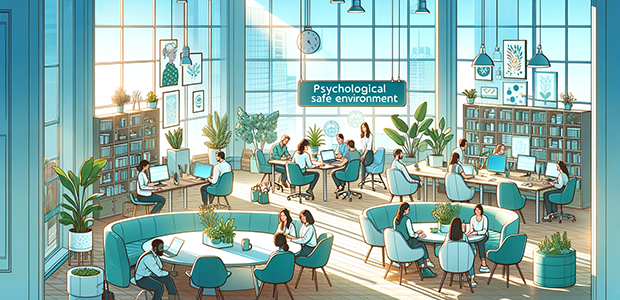
Understanding psychological safety in the workplace
On International Women's Day, it is often a good time to raise collective awareness to the myriad challenges that women face in the workplace, including the issue of psychological safety.
Psychological safety refers to the sense of confidence that employees feel in being able to express their opinions, ideas, and concerns without fear of embarrassment or retribution. This concept is pivotal, particularly for startups, where innovation, agility, and collaboration are often key to success.
The importance of psychological safety
At its core, psychological safety facilitates an environment where open communication, creativity, and mutual respect can flourish.
In the dynamic and often uncertain environment of a startup company, fostering a culture that encourages risk-taking and open dialogue can be the difference between stagnation and growth. Enabling a safe space for colleagues to voice ideas, challenge assumptions, and bring their full selves to work is vital for agility and problem-solving in an often evolving market.
Speaking on the importance of businesses having a psychological safe environment, Charlotte Dixon, Psychologist and Senior Consultant at Designed4Success, comments: “Psychological safety is essential for development on both individual and organisational levels. Without a culture of psychological safety, opinions aren't shared, issues aren't raised, and people don't feel valued. It's a slippery slope that makes collaboration and problem solving very difficult and costs companies thousands every year.”
Spotlighting safety on International Women’s Day
Studies and reports have highlighted that women, especially those in male-dominated industries, are more vulnerable to feeling unsafe in expressing their views, ideas, or concerns due to a higher risk of facing bias, discrimination, or harassment.
Research conducted by McKinsey & Company highlights a concerning trend: women often perceive their contributions as being undervalued and feel that their workplaces do not provide a psychologically safe environment. Furthermore, the Fawcett Society has found that an alarming 72% of women have encountered sexism at work. Experiences such as these can significantly impact a person’s sense of self-worth and lead to feelings of vulnerability. In turn, this lack of security can cause employees to withdraw, hesitate to engage, contribute, or innovate.
The absence of psychological safety not only impedes full participation and innovation, it also hampers areas such as career advancement, which is why it’s important for businesses of any and every size to recognise these issues and take proactive steps towards creating an inclusive and supportive work environment where every employee, regardless of gender, feels valued, heard, and respected.
Benefits for businesses and employees
The rewards of cultivating a psychologically safe workplace extend far beyond the immediate team dynamics.
For businesses, it translates into enhanced innovation, as employees feel empowered to propose alternative solutions without fear of failure. This can lead to the development of unique products, services, and processes that carve out competitive advantages in crowded markets. Also, teams characterised by high levels of psychological safety tend to be more resilient, bouncing back more effectively from setbacks and maintaining momentum in the face of challenges.
For employees, the benefits are equally profound. Psychological safety is linked to higher levels of job satisfaction, reduced stress, and greater work engagement. Employees in such environments are more likely to report higher job satisfaction, exhibit greater loyalty to the company, and demonstrate higher productivity levels. This not only enhances the quality of work life for individuals but also contributes to a positive organisational culture that attracts and retains top talent.
Implementing psychological safety
Creating a psychologically safe workplace does not need to involve complex initiatives and costly exercises. Startups can create this environment through simple, actionable strategies. Here, Charlotte details some simple, yet cost-effective strategies SMEs can implement to ensure the psychological safety of employees:
“Cultivating a psychologically safe environment is about creating a culture that values people authentically, with all their strengths and weaknesses.
“A big difference SMEs can make is to encourage their leaders to share their own journeys of failure and success openly with their teams. Particularly to show acceptance of both strengths and weaknesses and acknowledge how this has moulded them into the strong (and imperfect) leaders they are today.
“This will help their teams feel comfortable in taking risks in sharing thoughts, ideas, and concerns in order to learn and develop better solutions.
“There are a huge range of techniques that can improve psychological safety. A good first step would be to get feedback from your team on what they feel is missing from the culture. This may lead to putting intentional frameworks in place. For example, having ground rules in meetings so that no one speaks over anyone else regardless of role, biyearly anonymous feedback for the whole team, genuine and timely recognition of achievements, acknowledging and celebrating differences and promoting the belief at every individual adds value.
“Another way of promoting a supportive psychologically safe culture is promoting learning by getting involved in Learning at Work Week of which you can find more details on the Designed4Success website.”
A duty of care
In the journey towards establishing and maintaining a psychologically safe workplace, it is vital to recognise our responsibility towards ourselves and our colleagues. This means actively contributing to an environment where everyone feels safe to express themselves, challenge the status quo, and grow, which then leads to more successful workplaces where respect, innovation, and collaboration are part of the very fabric of our daily interactions.
Addressing psychological safety on International Women's Day is not just about highlighting these challenges, it’s also about committing to tangible actions that can dismantle the barriers women face. The celebration of IWD serves as a poignant reminder of the work that still needs to be done in ensuring all employees, regardless of gender, can thrive in a psychologically safe environment.

